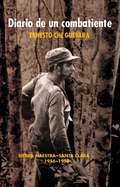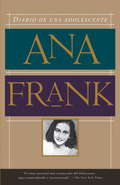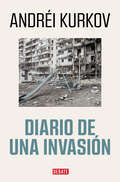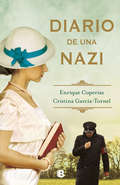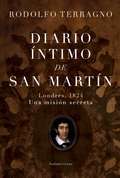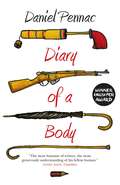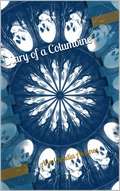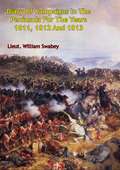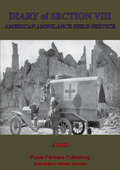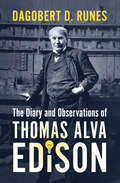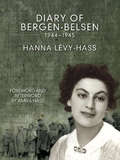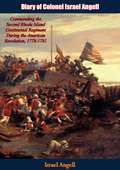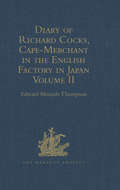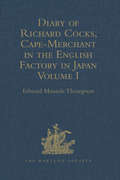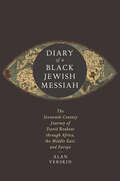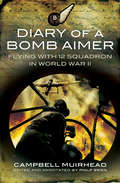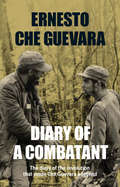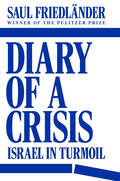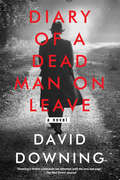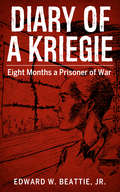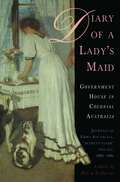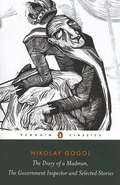- Table View
- List View
Diario de un combatiente
by Ernesto Che GuevaraChe's original, never-before-published diaries from the guerrilla war in Cuba's Sierra Maestra.Unpublished for over fifty years, these dozen notebooks were the source material for the articles that comprise Che's famous Reminiscences of the Cuban Revolutionary War, on which Steven Soderbergh has based his movie Che: The Argentine.Like Che's Bolivian Diary, these daily reflections reveal as much about the author as they do about the events and individuals described. Che's comments are always incisive, often highly self-critical, and sometimes brutally frank.This book includes many new, unpublished photos from the private collection of Che's widow Aleida March and a fascinating introduction by veteran Cuban revolutionary Armando Hart, who was the victim of Che's pen in these diaries, but who later became one of his closest political collaborators.As a new, unpublished work by Che Guevara, this book will attract considerable attention and will be published in English in spring 2009.
Diario de una adolescente
by Anne FrankUn testimonio único sobre el horror y la barbarie, y una celebración del espíritu humano y las ganas de vivir Diario de una adolescente es una de las biografías más queridas de todos los tiempos, además de uno de los documentos más perdurables del siglo XX. Desde su publicación en 1947, continua cautivando a lectores de todas las edades y ha sido leído por millones de personas en todo el mundo. En junio de 1942, tras la invasión Nazi de Holanda, los 8 miembros de la familia Frank, se ocultaron en una buhardilla anexa al edificio donde el padre de Anne tenía sus oficinas. Allí permanecieron recluidos hasta agosto de 1944, fecha en que fueron detenidos y enviados a campos de concentración. En ese lugar y en las más precarias condiciones, Anne Frank, con tan solo trece años, escribió su estremecedor Diario. Descubierto poco tiempo después en ese mismo ático, Diario de una adolescente captura el admirable espíritu de Anne y su familia, mientras sobreviven al horror más grande que el mundo moderno había visto sin jamás perder su sobrecogedora humanidad.
Diario de una invasión
by Andrei KurkovAndrei Kurkov, uno de los novelistas más reconocidos de Ucrania y enemigo declarado de Putin, denuncia con su pluma los crímenes que está cometiendo Rusia contra su patria. «Un Bulgákov moderno [...]. Un Murakami ucraniano». Phoebe Taplin, The Guardian «Al principio no entendíamos qué era la guerra. No puedes entenderlo hasta que la escuchas y la ves». El 24 de febrero de 2022 el ejército ruso invadió Ucrania y dio comienzo a una brutal guerra. En este libro imprescindible, Andréi Kurkov narra el terrible impacto del conflicto a través de una crónica personalísima, que es, a la vez, un relato asombroso del territorio. Diario de una invasión explora la identidad nacional ucraniana a través de las historias de los ciudadanos, que resisten unidos para defender el estado democrático, liberal y diverso al que pertenecen. Durante la invasión, el pan se hornea entre los escombros y se comparte entre la gente, los heridos son trasladados a trenes de evacuación, las ancianas escapan de los pueblos —ahora ocupados— cargando con sus ruidosos gallos. Y, a pesar de todas las dificultades, la esperanza permanece: todavía nacen niños en ciudades sitiadas y los granjeros arriesgan sus vidas para trabajar una tierra atestada de explosivos enterrados y sin detonar. En este emocionante relato, Kurkov entrelaza su experiencia personal con la de otros desplazados por la guerra y las comunidades que lo han arriesgado todo para cuidar de ellos, mientras esperan, con una irrefrenable fortaleza de espíritu, poder regresar a casa algún día. La crítica ha dicho:«Aunque se basa en la cruda realidad de la guerra, Abejas grises se lee por momentos como una fábula. [...] Al leerlo, uno se sien transportado a un tiempo de una mayor inocencia».Keith Gessen, The New Yorker «Una especie de Kurt Vonnegut ucraniano».Ian Sansom, The Spectator «Kurkov en estado puro, con su talento de narrador que sabe emocionar, sorprender y situarse a la altura del ser humano».La Croix
Diario de una nazi
by Cristina García-Tornel Enrique CoperíasNingún muro puede ocultar el horror para siempre. Cracovia, 1943. Ingrid, defensora incondicional de Hitler, acaba de mudarse a Polonia en el momento de máximo esplendor del nacionalsocialismo. La clase alta alemana vive entre fiestas, grandes mansiones, lujos y despreocupación en el territorio ocupado. En los primeros días del verano, su vida se entrelaza con la de Clara, una misteriosa mujer con quien comparte las largas temporadas que sus maridos -altos cargos de Auschwitz- pasan fuera de casa. Mientras Clara intenta protegerse de su pasado, que la acecha cada vez más de cerca, Ingrid vivirá una peligrosa historia de amor. Sus ideas nazis se irán desmoronando al descubrir lo que esconden los muros y las alambradas del campo de concentración: una realidad que supera cualquier pesadilla y hará tambalearse toda su vida. A través de una narración impecablemente documentada, Diario de una nazi nos traslada al momento más infame de la historia del siglo xx desde un punto de vista muy poco habitual: el de los alemanes que quisieron cerrar los ojos ante el horror.
Diario íntimo de San Martín: Londres, 1824 Una misión secreta
by Rodolfo TerragnoTerragno reconstruye el día a día de las actividades de San Martín y desu círculo íntimo durante un año clave, 1824. Cada dato, circunstancia oanécdota surge de una escrupulosa investigación histórica basada endocumentos y manuscritos que aún permanecen inéditos. Para los historiadores y, en consecuencia, para la historia que hallegado a nuestros días, la vida pública del Libertador San Martíntermina en 1822 con su retiro del Perú y su viaje a Europa. Este nuevolibro de Rodolfo Terragno prueba que el «retiro» no fue tal: dos añosmás tarde lo encontramos en Inglaterra cumpliendo un plan secreto cuyoobjetivo central era consolidar la independencia de Sudamérica. Comoparte de ese plan llegó a organizar un viaje de regreso al Perú -luegofrustrado- para reanudar la lucha junto a Bolívar. Bajo la formaliteraria de un diario personal, redactado en tiempo presente, estediario incluye, junto a importantes revelaciones, curiosidades ycostumbres de aquellos años en Inglaterra, biografías de aventureros yreferencias a excéntricos personajes de la vida cortesana.Y, a diferencia de gran parte de la bibliografía sanmartiniana -queinteresa solo a los argentinos-, se presenta a San Martín como unafigura internacional con conexiones y proyección en toda Europa yAmérica del Sur. El Libertador reaparece como un gran político, queprefiere resolver los conflictos sin recurrir a la violencia, pero quedebe enfrentar críticas, celos, ataques, difamaciones y complots.
Diarios 1984-1989
by Sándor MáraiDiarios, 1984-1989, primer volumen de los diarios que se traduce al español, nos acerca al Sándor Márai más íntimo y desgarrador, al hombre que, reconciliado con la inminencia de la muerte, pasa revista a sus inquietudes más hondas y esenciales. Celebrado por su inusitado talento para reflejar en sus novelas el esplendor y crepúsculo del humanismo centroeuropeo, y testigo minucioso de los grandes acontecimientos que conmovieron Europa en la primera mitad del siglo pasado, Sándor Márai vio como su obra quedaba relegada al olvido tras abandonar la Hungría comunista en 1948. Después de un azaroso exilio que lo llevó a la ciudad californiana de San Diego, muy lejos de la vieja Europa, pasó sus últimos años en un aislamiento casi absoluto. Privado de su público natural, Márai escribió cinco de los seis tomos de sus diarios en el exilio, el último, redactado entre 1984 y 1989, es un testimonio apasionante y profundamente conmovedor de un hombre decidido a enfrentarse sin ambages con la muerte. Alternando recuerdos personales, instantáneas reveladoras de la vida cotidiana, con comentarios sobre diversos temas de actualidad y apuntes sobre la lectura y la tarea de escribir, el gran autor húngaro -que destaca por la potencia de su palabra y la perfecta lucidez de su mente- se convierte en observador implacable de su propio deterioro físico y narra, sin embellecerlo, el último drama de su existencia: la enfermedad y muerte de su amada esposa, Lola Matzner, con quien durante sesenta y dos años lo había compartido todo. Márai reflexiona sobre el luto y la soledad, cada vez más insoportable, al tiempo que se prepara para el momento final: «Estoy esperando el llamamiento a filas, no me doy prisa, pero tampoco quiero aplazar nada por culpa de mis dudas. Ha llegado la hora.» Escasas semanas después de esta anotación, Sándor Márai se quitaba la vida con un disparo. Reseñas:«Las escuetas y certeras anotaciones se leen con una angustia creciente, con tristeza y respeto.»Die Zeit «Lapidario, preciso, valiente y emocionante.»Neue Zürcher Zeitung
Diarios De Motocicleta
by Ernesto Che GuevaraUn muy joven Ernesto Guevara viaja por América Latina, junto a su amigo Alberto Granado, parten de Argentina y se enfrentan a aventuras y realidades que los transformarán para siempre.Vivido y entretenido diario de viaje del joven Che. Esta edición incluye fotografías inéditas tomado por Ernesto a los 23 años, durante su travesía por sudamérica y es presentada con un tierno prefacio de Aleida Guevara, quien ofrece una perspectiva distinta de su padre, el hombre y el icono de millones de personas."Nuestro film es sobre un hombre joven, el Che, lleno de amor por el continente y buscando su lugar en él." -- Walter Salles, director del película "The Motorcycle Diaries""Si tengo que ser sincera, debo decir que al leer me fui enamorando del muchacho que mi padre había sido." --Prefacio de Aleida Guevara
Diary Of A Body
by Daniel PennacFrom a particularly humiliating accident at scout camp, to the final stages of terminal illness, Daniel Pennac's warm, witty and heart-breaking novel shows the rise and fall of an ordinary man, told through his observations of his own body.It is with damp eyes (not to mention underpants) that our narrator begins his diary, seeking through it to come to terms with the demoralising quirks of his fleshy confines. Through the joys and horrors of puberty to the triumphs of adolescence, we grow to love him through every growth, leak and wound, as he finds himself developing muscles, falling in love, and then leaving school to join the French Resistance.Yet, as ever, this is only half the story. As years pass and hairs grey, everything he took for granted begins to turn against him. Tackling taboo topics with honesty and charm, Pennac's wit remains sharp even as everything else begins to sag. This is a hugely original story of the most relatable of unlikely love stories: a human, and the body that defines him.Translated from the French by Alyson Waters
Diary Of A Columbine
by Ana Bowlova Ana Claudia AntunesHarlequin goes down in a tight spot when trying to face his past while ruining Pierrot´s reputation towards his beloved one. But Colombine now divided between two loves has to make the right choice, or else all her ancestral line will undergo its most brutal designs. Will she fail to prove herself out and fight against the evil? Or will love prevail and release their souls to the spinning realms of existence to save them all? The last book from The Pierrot´s Love Series, which is part of the trilogy Memoirs of an Amazon:Witches of Avignon (The Past)The Pierrot´s Love (The Present)Out Of Thin Air (The Future)Anne, a teenage girl who dreams of being a dancer suffers an obsession and becomes haunted by a ghost of a ballerina in the nineteenth century, who prefers to be called Tata, and who, like a rat, appears out of nowhere and goes beyond, literally, in a blink of an eye, twerking, trolling and twisting facts and factions, and who insists into contacting her in every possible way (even by cell phone and text messages) to tell her story. So she decides to write her story in the form of a play giving vent to her artistic vein, before the ghost dancer make her wiah to cutting the veins of them both, tormenting her from head to toe. As it were not enough many tangles and so many caveats and ties to untie the lies and laces from her Ballet shoes, here comes another ghost that looks like it came to torment her too. Giovanni, boyfriend and possible serial killer, and that also seems to have a deep relationship with the teenager proves to be helpful and kind to her, but everything seems to be just a clever way to conquer her world to dominate her and make she do everything he tells her to do, to insert her in their midst to be involved in the same case. Then he begins to tell the story from his point of view. Having two versions, in which one is she going to believe? And as s
Diary Of A Pioneer Boy (Steck-Vaughn Pair-It Books #Proficiency Stage 5)
by MassieA boy's view of moving from St. Louis, Missouri to Montana in 1885.
Diary Of Campaigns In The Peninsula For The Years 1811, 1812 And 1813
by Lieut. William SwabeyLieutenant Swabey's personal diary is a unique account of day-to-day events during the Peninsula War and the epic battles that marked this defiant campaign against Napoleon. The volume also includes Swabey's retrospective reminiscences of the war--an addition of amusing anecdotes which complement the diary. Witnessing the fierce cruelty of the Spaniards, encountering hunger and sickness, Swabey's account takes us from July 1811 to August 1813 when he was invalided home, and includes The Siege of Ciudad Rodrigo, The Siege and Storm of Badajoz, The Battle of Salamanca, The Battle of Vitoria and The Siege of St. Sebastian.
Diary Of Section VIII, Of The American Field Ambulance Service
by Anon."As the quick transportation of wounded from the front to the nearest hospital is so great a factor in saving their lives, the American Ambulance Field Service was organized soon after the beginning of the war, and during the subsequent two years its achievement has fully demonstrated the value of its purpose. It has now in the field more than 300 motor ambulances. These are driven by young American volunteers, most of whom are graduates of American universities. To them has been successfully entrusted the vitally important matter of bringing the wounded in the shortest possible time from the trenches to places where the first surgical help can be given. Upon this first surgical help largely depends, naturally, the chance of the wounded surviving long enough to reach the base hospitals. These ambulances are grouped in sections of twenty to thirty cars, and attached to the French Armies. They carry wounded between the front and the Army Hospitals within the Army Zone.The French Army has cited these Sections more than twenty times for distinguished services; has conferred the Croix de Guerre, for bravery, on sixty-six members of the Service, and upon two, the Médaille Militaire, the highest honor for military valor in France."--From the American Ambulance Service Leaflet included in the book.
Diary and Observations of Thomas Alva Edison
by Dagobert D. RunesGain insight into the unique thinking and philosophy of the world&’s most prolific inventor with this collection of his writings.American scientist and businessman Thomas Edison contributed much to the well-being and comfort of our modern life. He gave us the electric light, the phonograph, and the motion-picture camera, along with more than one thousand other inventions. Edison was, as fellow inventor Guglielmo Marconi put it, &“one of the world&’s greatest benefactors.&” In this volume, editor Dagobert D. Runes presents Edison&’s diary along with a selection of his social and philosophical ideas taken from available notes, statements, and observations. Readers will discover that many of Edison&’s casual remarks made decades ago have a definite contemporary significance. His propositions in ethics, philosophy, music, and education show a rare combination of whimsy and deep sincerity.
Diary of Bergen-Belsen, 1944–1945: 1944-1945
by Hanna Lévy-HassA resistance fighter&’s &“remarkable&” memoir of her imprisonment at the infamous Nazi concentration camp (The New Yorker). Hanna Lévy-Hass, a Yugoslavian Jew, emerged a defiant survivor of the Holocaust. Her observations shed new light on the lived experience of Nazi internment during World War II, and she stands alone as the only resistance fighter to report on her own experience inside the camps—doing so with unflinching clarity in dealing with the political and social divisions inside Bergen-Belsen. In this volume, her insightful diary is accompanied by an introduction from her daughter, Amira Hass, an Israeli journalist renowned for her reporting from the West Bank and Gaza. &“A poignant testimonial . . . Hanna Lévy-Hass was clearly a quite extraordinary woman.&”—Tony Judt, Pulitzer Prize finalist and author of Postwar: A History of Europe Since 1945
Diary of Colonel Israel Angell: Commanding the Second Rhode Island Continental Regiment During the American Revolution, 1778-1781
by Israel AngellIsrael Angell (August 24, 1740 - May 4, 1832) was a Continental Army officer of the American Revolutionary War.Angell served nearly throughout the entire war in Rhode Island and was successively promoted.He was appointed a major of Colonel Daniel Hitchcock's Regiment at the outbreak of the American Revolution. He served with the regiment in the Siege of Boston. When the Continental Army was reorganized on January 1, 1776, Hitchcock's Regiment was re-designated as the 11th Continental Infantry. Late in 1776, Hitchcock was appointed as a brigade commander and Angell assumed command of the regiment. The regiment was re-designated as the 2nd Rhode Island Regiment on January 1, 1777 and Angell was promoted to lieutenant colonel of the regiment. A few days later, he was promoted to colonel in command of the regiment following the death of Colonel Hitchcock on January 13, 1777.Angell served at Valley Forge in the Winter of 1777 to 1778, and in the following battles:Siege of Boston (1775)Battle of Brandywine (1777)Battle of Red Bank (1777)Battle of Monmouth (1778)Battle of Rhode Island (1778)Battle of Springfield (1780)He was particularly distinguished in the Battle of Springfield, where he withheld a key bridge from British troop advances. He received recognition correspondence for this act of heroism from George Washington and Nathanael Greene. He also served at various places in Rhode Island and New Jersey and along highlands of the Hudson River, most notably at Peekskill and West Point. He retired from the army on January 1, 1781, after the two Rhode Island regiments were consolidated into a single regiment known as the Rhode Island Regiment.—American dictionary of Biography
Diary of Richard Cocks, Cape-Merchant in the English Factory in Japan 1615-1622 with Correspondence: Volume II (Hakluyt Society, First Series #6667)
by Edward Maunde ThompsonContinues from First Series 67, with the years 1618-1622, .together with Cocks's correspondence with the East India Company and others. This is a new print-on-demand hardback edition of the volume first published in 1883.
Diary of Richard Cocks, Cape-Merchant in the English Factory in Japan 1615-1622, with Correspondence: Volume I (Hakluyt Society, First Series #6667)
by Edward Maunde ThompsonEnds December 1617. Continued to 1622 in the following volume (First Series 67). This is a new print-on-demand hardback edition of the volume first published in 1883.
Diary of a Black Jewish Messiah: The Sixteenth-Century Journey of David Reubeni through Africa, the Middle East, and Europe (Stanford Studies in Jewish History and Culture)
by Alan VerskinIn 1524, a man named David Reubeni appeared in Venice, claiming to be the ambassador of a powerful Jewish kingdom deep in the heart of Arabia. In this era of fierce rivalry between great powers, voyages of fantastic discovery, and brutal conquest of new lands, people throughout the Mediterranean saw the signs of an impending apocalypse and envisioned a coming war that would end with a decisive Christian or Islamic victory. With his army of hardy desert warriors from lost Israelite tribes, Reubeni pledged to deliver the Jews to the Holy Land by force and restore their pride and autonomy. He would spend a decade shuttling between European rulers in Italy, Portugal, Spain, and France, seeking weaponry in exchange for the support of his hitherto unknown but mighty Jewish kingdom. Many, however, believed him to favor the relatively tolerant Ottomans over the persecutorial Christian regimes. Reubeni was hailed as a messiah by many wealthy Jews and Iberia's oppressed conversos, but his grand ambitions were halted in Regensburg when the Holy Roman Emperor, Charles V, turned him over to the Inquisition and, in 1538, he was likely burned at the stake. Diary of a Black Jewish Messiah is the first English translation of Reubeni's Hebrew-language diary, detailing his travels and personal travails. Written in a Hebrew drawn from everyday speech, entirely unlike other literary works of the period, Reubeni's diary reveals both the dramatic desperation of Renaissance Jewish communities and the struggles of the diplomat, trickster, and dreamer who wanted to save them.
Diary of a Bomb Aimer: Flying with 12 Squadron in World War II
by Campbell MuirheadCampbell Muirhead kept a meticulous diary of his wartime RAF service from the day that he set forth to train as a pilot in Canada and the USA in 1942 to the end of his wartime service with 12 Squadron Bomber Command. He was unable to pass the flying course and decided to retrain as a bomber because he wished to become operational as soon as possible. The book is particularly emotive as he wrote in the common parlance of those wartime days and truly reflects the emotions, fears and feelings of those caught up in that mighty conflict. His diligent observations of life in the RAF from joining-up, crossing the Atlantic, training in the New World bring back wartime life as it really was. His descriptions of the perils of flying on bombing raids deep into the heart of Germany truly reflect the many different aspects of life in a front-line squadron in a way that can only be told by one who was there.
Diary of a Combatant
by Ernesto Che GuevaraThe publication of this title by Ocean Sur in Spanish in July 2011 provoked considerable international attention (including CNN). This never-before-published diary (comprising a dozen small notebooks) Ernesto Che Guevara kept during the guerrilla war in Cuba when he joined the struggle to overthrow the Batista dictatorship that led to the 1959 revolution has now been meticulously transcribed by his widow, Aleida March.Why did it take over fifty years for this diary to be published? Maybe because of some caustic comments Che makes in his usual brutally frank style. Maybe it was felt appropriate to wait until Fidel Castro had produced his own memoirs (now published by Ocean Press as The Strategic Victory).In launching the book in Havana in July 2011, editor Maria del Carmen Ariet marked that it was "never clear whether or not Che wanted these diaries published" as he had reworked several pieces into his famous Reminiscences of the Cuban Revolutionary War, on which Steven Soderbergh based part one of his epic movie Che, starring Benicio Del Toro.Nevertheless, all Che's diaries-from his early Motorcycle Diaries and its sequel, Latin America Diaries, through to his last diary from Bolivia-are extraordinary examples of his literary gift and his political incisiveness, in terms of his personal reflections, his criticisms and self-criticism, and his observations about others and events.Other features of this new book are fifty-eight unpublished photos from Che's personal archive and unpublished letters (including correspondence between Che and Fidel), an index, and extensive glossary.
Diary of a Crisis: Israel in Turmoil
by Saul FriedländerSearching reflections on the crisis in Israel and Gaza by a Pulitzer Prize-winning historian of the HolocaustDiary of a Crisis explores the past tumultuous and traumatic year in Israel-Palestine. The eminent historian Saul Friedländer began a diary of Israeli politics in January 2023 as the country was convulsed by protests against Netanyahu&’s attempt to overhaul the judiciary. Hundreds of thousands took to the streets to demonstrate against this threat to democracy. But the protests said nothing about the Palestinian question—the "elephant in the room," according to Friedländer, who resumed his diary after Hamas&’s 7 October assault on southern Israel. Israel was facing one of the worst crises in its history, he observes, under the worst possible internal conditions.Friedländer weaves together profound reflections on a national history in which he has been an active participant. He describes how Prime Minister Golda Meir once flatly declared to him, "There is no Palestinian people." For Friedländer, on the other hand, the fight for democracy is inseparable from equality of treatment for Arab and Jewish citizens and an end to Israeli domination over Palestinians in the Occupied Territories. He argues that despite the continuing bloodshed, a two-state solution remains the only long-term answer to this most intractable of conflicts.
Diary of a Dead Man on Leave
by David DowningFrom bestselling author David Downing, master of historical espionage, comes a heart-wrenching depiction of Germany in the days leading up to World War II and the difficult choices of one man of conviction. In April 1938, a man calling himself Josef Hofmann arrives at a boarding house in Hamm, Germany, and lets a room from the widow who owns it. Fifty years later, Walter Gersdorff, the widow’s son, who was eleven years old in the spring of 1938, discovers the carefully hidden diary the boarder had kept during his stay, even though he never should have written any of its contents down. What Walter finds is a chronicle of one the most tumultuous years in German history, narrated by a secret agent on a deadly mission. Josef Hofmann was not the returned Argentinian immigrant he’d said he was—he was a communist spy under Moscow’s command trying to reconnect with remaining members of Germany’s suppressed communist party. Hofmann’s bosses believe the common workers are the only way to stop the German war machine from within. Posing as a railroad man, Hofmann sets out on his game of “Russian roulette,” approaching Hamm’s ex-party members one at a time and delicately feeling out their allegiances. He always knew his mission would most likely end in his death, and he was satisfied to make that sacrifice for the revolution if it could help stop Hitler and his abominable ideology. But as he grows close to the Gersdorffs, accidentally stepping into the role of the father Walter never had, Hofmann begins to wish for another kind of hope in his life.
Diary of a Kriegie
by Edward William BeattieDiary of a Kriegie is the personal account of United Press correspondent Edward Beattie following his capture in France and imprisonment by the Germans for the final eight months of the Second World War. Beattie was kept in a series of internment camps, ending up at Stalag III-A at Luckenwalde, Germany. He was released when the Red Army liberated the camp in April 1945. The book provides a detailed look at camp life, especially the longing for favorite foods (some interesting prisoner recipes are included). The arrival of Red Cross packages were much anticipated and an important addition to the prisoner’s otherwise meager diets. Beattie’s knowledge of Germany (he had worked as a reporter in Germany before the war) and fluency in the German language add interest to the diary as he was able to gain insights into the workings of the camp and his captors. This version includes 42 pages of drawings made by the author while a prisoner-of-war.
Diary of a Lady's Maid: Government House in Colonial Australia
by Helen Vellacott'A very busy day. Lord and Lady Carrington arrived from England. Miss Harbord, 3 Gentlemen in Suite, 3 children, two nurses, two maids, 2 valets. Every room occupied. 47 to dinner—in State dining room—and 500 in the evening. All went off capitally. We got to bed soon after 2 a.m.'The reliable, hard-working and loyal Emma Southgate began her diary when she journeyed across rough seas and under stormy skies from England to Australia in 1884. She travelled as lady's maid to Lady Loch, wife of the newly appointed Governor of Victoria. When they arrived in Melbourne and took up residence in the magnificent Government House, Emma had the presence of mind to continue her record of daily life. The legacy of her diligence is published here for the first time.Through Emma's words we can relive the halcyon days of colonial times: sumptuous parties in elegant ballrooms and receptions on rolling lawns; stylish travel through the colonies of Victoria, Tasmania, New South Wales and South Australia; holidays in a grand home at Mount Macedon; important international visitors; and the social whirl that accompanied occasions such as Melbourne Cup week.These events are charmingly described in Emma's diaries from a behind-the-scenes point of view—the weariness of having to serve tea to thousands of 'ladies and gentlemen', visits to the poor and excursions to the beach, illnesses among staff and the kindnesses of her employers.Emma's authentic evocation of her life sparkles. Unpretentious and forthright, Emma's words captivate the reader as they bring to life the people, the places and the times.Besides Emma's accounts, Helen Vellacott has placed the newspaper reports of the day that show the official view—often quite different from Emma's observations. In this way, and with intriguing additional comment and information, Diary of a Lady's Maid gives us an insight into early Australian society.
Diary of a Madman, the Government Inspector and Selected Stories
by Ronald Wilks Robert A. Maguire Nikolai GogolThis expanded collection of influential Russian satirist Nikolay Gogol's ingenious pieces now includes his most famous play.
